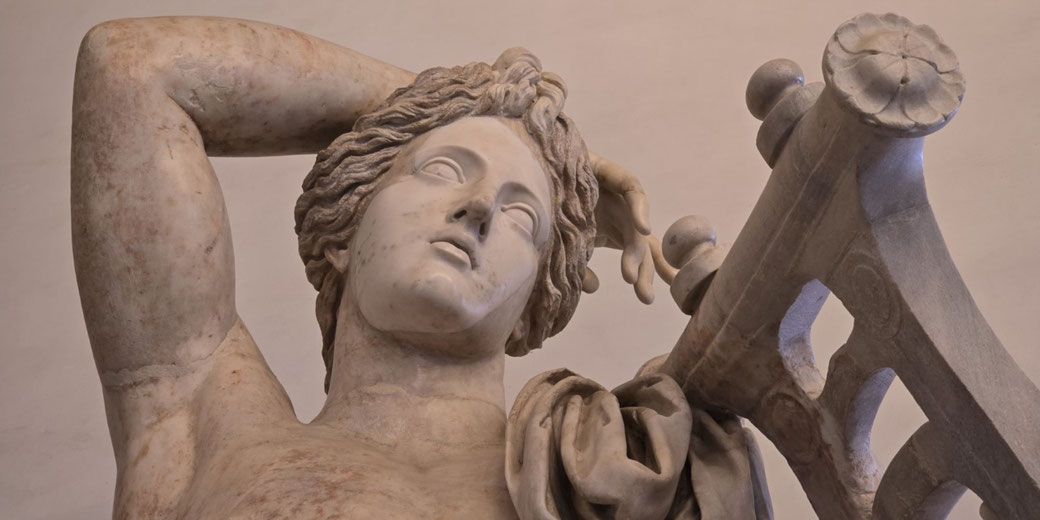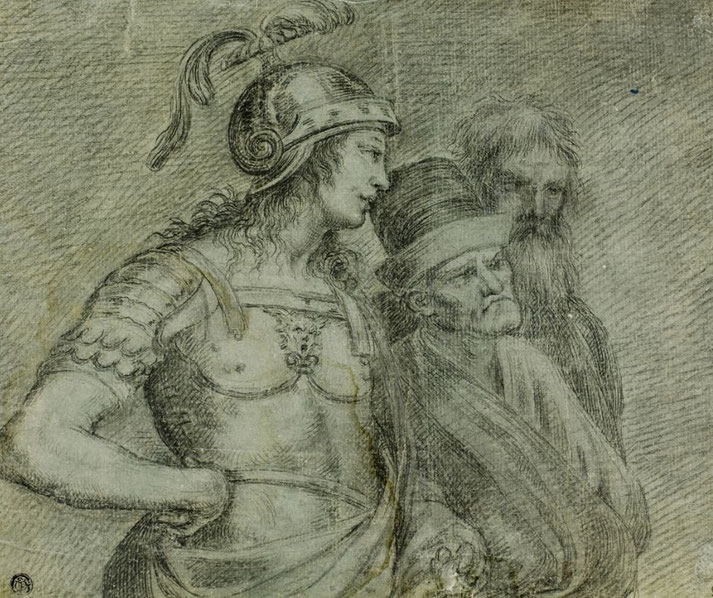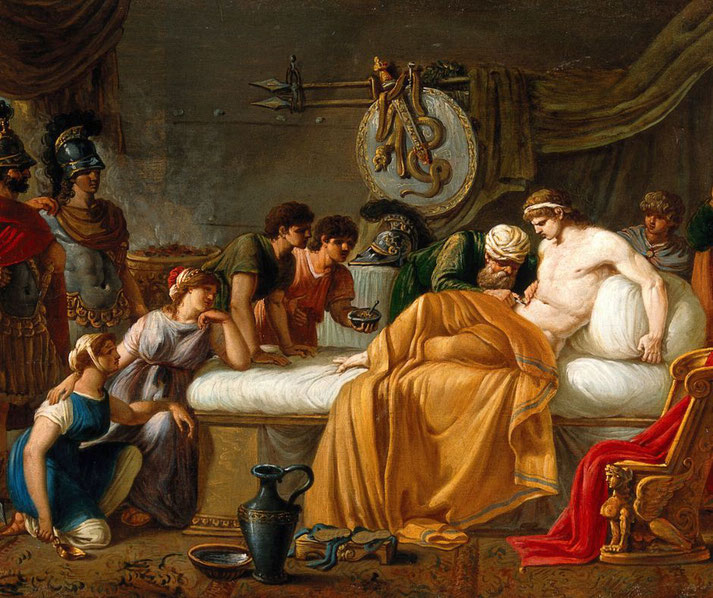Alcibiades: The cunning Greek general who betrayed both the Athenians and the Spartans

Alcibiades was one of the most controversial figures of the Peloponnesian War. He belonged to a wealthy Athenian family and used his lineage and charm accompanied by political cunning to rise to the highest levels of influence in the city.
He served as a general, an ambassador, and a manipulator who treated each alliance as a stepping stone toward personal advantage.
Eventually, he turned against Athens, then Sparta, and involved Persia in the conflict, which undermined the power balance in the eastern Mediterranean and led to mistrust across the Greek world.
Alcibiades' entry into Athenian politics
Alcibiades entered public life during the final years of Periclean influence, when Athens struggled with the long-term effects of the Peloponnesian War.
He received a privileged upbringing as the ward of Pericles, which gave him access to elite education and rhetorical training as well as the company of influential citizens.
His father, Cleinias, had died in battle around 447 BCE (though it remains uncertain whether this occurred at Coronea) and his mother, Deinomache, belonged to the powerful Alcmaeonid family.
He also studied under Socrates, who reportedly admired his intelligence and beauty.
His speeches in the Assembly impressed the public, because of their personal presence and confidence rather than content alone.
Initially, Alcibiades built support among younger voters when he mocked traditional values and he called for firm action against Sparta.
When the Peace of Nicias brought a temporary halt to hostilities in 421 BCE, he undermined it by accusing Nicias of favouring the Spartans.
His rivalry with Nicias intensified as Alcibiades proposed new alliances with Argos, Elis, and Mantinea.
These diplomatic moves aimed to encircle Sparta and prepare Athens for renewed conflict.
Eventually, in 415 BCE, Alcibiades persuaded the Assembly to launch the Sicilian Expedition, and he promised vast rewards through the conquest of Syracuse.
Many citizens trusted his confidence and voted in favour of the campaign, unaware of the dangers that lay ahead.
The expedition included approximately 134 triremes and around 27,000 men, with Alcibiades sharing command alongside Nicias and Lamachus.
Thucydides estimated the total force, including sailors, soldiers, and support staff, exceeded 40,000 men, although the exact number remains debated.
Shortly after the fleet departed, however, a scandal broke out in Athens. Alcibiades was accused of religious offence by mutilating the sacred hermai statues and mocking the Eleusinian Mysteries.
Rather than return home to face trial, he fled to Sparta.

Alcibiades' shock defection to Sparta
At Sparta, Alcibiades presented himself as an expert in Athenian affairs and offered his services to help destroy the city he had once served.
He quickly adapted his appearance and behaviour to meet Spartan expectations and earned the trust of influential leaders.
On his recommendation, the Spartans fortified Decelea in Attica in 413 BCE, which crippled Athenian agriculture, cut off the silver mines at Laurium, and forced the city to rely on imported grain.
In addition, he advised them to send troops and ships to support Syracuse. The success of these measures increased his standing in the Spartan court.
Eventually, however, his behaviour exposed him. He began an affair with the wife of King Agis II and boasted that her child was his.
The scandal outraged the royal household and made his position impossible to maintain.
Because he feared assassination, Alcibiades fled again. This time, he sought the protection of Persia.
He approached the satrap Tissaphernes and argued that Persian interests would be best served by keeping both Athens and Sparta locked in a long conflict.
As a result, the satrap gave him protection and listened to his suggestions during informal discussions about the conflict between the warring Greek states.

Why Alcibiades then sided with Persia
In Persia, Alcibiades used his knowledge of Greek diplomacy to advise Tissaphernes on how to stall the war without committing to either side.
He insisted that Persia should offer support only when necessary and shift its promises depending on who needed help.
This advice allowed Persia to weaken both powers and restore control over the Ionian cities.
His advice delayed Persian military aid to Sparta and created tension between Tissaphernes and the Spartan commanders.
The satrap, who acted under pressure from Darius II, remained cautious.
Eventually, Alcibiades saw a chance to return to Athenian politics. After the oligarchic takeover in 411 BCE, he contacted the new rulers and promised to gain Persian support for Athens if they restored him.
His claims failed to convince the satrap, but they reached the ears of the Athenian fleet stationed at Samos.
That fleet had rejected the oligarchy and declared loyalty to democracy.
To those sailors, Alcibiades presented himself as a victim of political injustice. He promised to win Persian backing and restore Athenian strength.
In turn, the fleet accepted him as their leader and allowed him to take a leading role in its operations, though formal command remained shared with other senior figures such as Thrasybulus.
From this group of supporters, he worked to win back influence over the war effort and prepare for his return to Athens.
Alcibiades' surprising return to Athens
In 407 BCE, Alcibiades returned to Athens after a series of naval victories had improved his reputation.
These included the battles of Abydos in 411 BCE and Cyzicus in 410 BCE. He helped reclaim Byzantium and other key cities, which reopened the grain route from the Black Sea through the Hellespont and the Bosporus.
As a result, the Athenians welcomed him home and dropped the charges that had forced him into exile.
During his return, he led the sacred ceremony to Eleusis, which showed his restored religious standing.
Also, he took command of the fleet and launched new operations in the eastern Aegean.
Eventually, however, the limits of his leadership became clear. While away from the fleet, his assistant Antiochus ignored his instructions and attacked the Spartans.
The result was a defeat at Notium. Antiochus was killed in the failed assault, and the Spartans, under Lysander, gained a crucial political victory.
Back in Athens, his enemies used the failure to strip him of command. He retired to his estate in Thrace and remained there, politically isolated.
Occasionally, he sent messages and offered strategic advice, but no one in Athens wanted to risk trusting him again.
Alcibiades' final exile and dramatic murder
During his final years in exile, Alcibiades turned once more to Persia. He attempted to warn the Persian leadership that Sparta was becoming too powerful and could threaten their interests.
Repeatedly, he offered his services to help manage relations between Persia and the Greek world. His past, however, made him too dangerous to trust.

In 404 BCE, as the Peloponnesian War neared its end, his presence in Phrygia drew attention from both Persian and Spartan officials.
He had taken refuge in a village near Celaenae, in the territory of Pharnabazus II.
His reputation for deception made him a threat to the fragile peace that was beginning to form.
In response, they conspired to eliminate him. One night, killers surrounded his home, set it alight, and waited for him to flee.
Ancient sources differ on what happened next, but some accounts claim he was struck down by arrows or javelins as he emerged from the flames.
In the end, Alcibiades' career showed how his charm and intelligence, backed by military skill, could elevate a man to the heights of power, yet without principle or loyalty, those same qualities became weapons that cut down everyone around him.
For Athens, Sparta, and Persia, his actions brought no lasting advantage, only more chaos.
His reputation remained controversial among later writers, and he continued to appear in works such as Plato's Symposium and Xenophon's Hellenica, as a warning example of drive without limits.
What do you need help with?
Download ready-to-use digital learning resources
Copyright © History Skills 2014-2025.
Contact via email
With the exception of links to external sites, some historical sources and extracts from specific publications, all content on this website is copyrighted by History Skills. This content may not be copied, republished or redistributed without written permission from the website creator. Please use the Contact page to obtain relevant permission.





